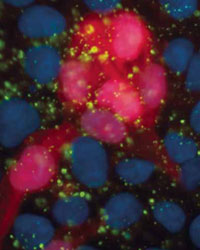Feature Story
Health Center Today, June 10, 2010
Ten UConn Stem Cell Projects Receive State Funding
By David Bauman

File photo of stem cells.
Ten University of Connecticut scientists have received awards from the Connecticut Stem Cell Research Advisory Committee (SCRAC) under a state grant competition designed to encourage researchers in Connecticut to undertake innovative, risk-taking investigations using embryonic and human adult stem cells.
Eight of the state grants, ranging from $200,000 to $1 million, were awarded to scientists based at the UConn Health Center in Farmington; and two researchers based at UConn’s Storrs campus received grants of nearly $200,000 each.
The grants were among a total of 22 research proposals awarded nearly $9.8 million in the fourth round of funding issued by the SCRAC, a 13-member committee in charge of developing the Connecticut stem cell research grants-in-aid program.
“These grants are a tremendous boost to the investigators,” says Marc Lalande, senior associate dean for research planning and coordination at the Health Center, director of UConn’s Stem Cell Institute, professor and chairman of the medical school’s Department of Genetics and Developmental Biology.
“The awards will fuel the research of some of the most creative stem cell scientists in the world, allowing them to stay on the cutting edge one of the most competitive areas of biomedical research,” he says.
The funded UConn projects will investigate wide-ranging aspects of embryonic stem cell biology, from better understanding the cells to developing new therapies. Some projects will focus on the mechanisms of encouraging embryonic stem cells to mature into adult cell types that can be used in therapies, while others will look for ways of effectively delivering these stem cells to damaged tissues.
Other projects take on the problem of understanding the competence of cell populations being studied for transplants, such as the proposal of Srdjan Antic, assistant professor of neuroscience at the Health Center. He received $500,000 in funding to establish a neuronal physiology and chemistry core facility that would permit the functional assessment of neurons generated from stem cells in sample cultures provided by scientists from around the state.
James Li, an assistant professor of genetics and developmental biology at the Health Center, has a long-standing interest in approaches to gene therapy. His grant of more than $992,000 will fund his proposal that seeks a possible treatment of Parkinson’s disease. The proposal aims to study the origin and development of Parkinson’s disease by generating human embryonic stem cells and patient-derived induced pluripotent stem cells carrying mutant proteins of the disease. Then by adding new genes to embryonic stem cells, or silencing genes in these cells, Li will seek ways to modify the embryonic stem cells for therapy.
Another grant of $1 million awarded to Laijun Lai, assistant professor in the Health Center’s Department of Immunology, builds on preliminary data he developed from a previous SCRAC grant that he received in 2008. Lai’s proposal aims to establish a method for generating functional blood stem cells from human embryonic stem cells. If successful, this could have a huge impact in improving human stem cell-based transplantation therapies for blood and immune diseases.
The SCRAC was established in 2005, when the legislature and Gov. M. Jodi Rell set aside $100 million for Connecticut-based embryonic and adult stem cell research through 2015. To date, the SCRAC has disbursed $49.4 million via four competitive rounds of its grants-in-aid program. Through the latest round of grants, the University of Connecticut’s total funding from the SCRAC amounts to more than $24 million.
In this fourth round, the committee received a total of 89 scientific proposals seeking more than $49 million for research projects. UConn and its Health Center submitted 40 of the research proposals. Yale University turned in 46, the University of Hartford submitted two, and Wesleyan University one.
University of Connecticut researchers receiving SCRAC grants include:
- Laijun Lai, assistant professor in the Department of Immunology at the UConn Health Center: ‘Generation of hematopoietic stem cells and T-cell progenitors from human embryonic stem cells,’ $1,000,000.
- James Li, assistant professor and associate director of the graduate program in genetics and developmental biology at the UConn Health Center: ‘Modeling Parkinson’s disease using human embryonic stem cells,’ $992,500.
- Srdjan Antic, assistant professor of neuroscience, Graduate School, UConn Health Center: ‘Stem cell physiology and chemistry core,’ $500,000.
- Arvind Chhabra, Department of Medicine, UConn Health Center: ‘To develop efficient methodologies to generate customized anti-tumor effecter T-cells from human embryonic stem cells and induced pluripotent stem cells by TCR engineering approach,’ $200,000.
- Carolyn Drazinic, assistant professor in the Departments of Psychiatry and Genetics and Developmental Biology at the UConn Health Center: ‘Discovering treatments to prevent neurodegeneration in Huntington’s disease using human embryonic stem cells and patient-derived induced pluripotent stem cells,’ $200,000.
- Rosa Guzzo, postdoctoral fellow in the Department of Orthopaedics at the UConn Health Center: ‘Generation of a novel source of induced pluripotent stem cells for the treatment of osteoarthritis,’ $200,000.
- Xiaofang Wang, senior postdoctoral fellow in the Stem Cell Core Lab, UConn Health Center: ‘Regulating caspase activity to enhance differentiation efficiency of human embryonic stem cells,’ $200,000.
- Li Yang, postdoctoral fellow in the Translational Genomics Microarray Core facility at the UConn Health Center: ‘Novel roles of long non-coding RNAs in human embryonic stem cells,’ $200,000.
- Radmila Filopovic, research professor in the Department of Physiology and Neurobiology at the Storrs campus: ‘Generation of layer V pyramidal neurons from human embryonic stem cells,’ $199,945.
- Brian Aneskevich, associate professor of pharmacology at the Storrs campus: ‘Nuclear receptor control of human epidermal stem cells,’ $199,894.


